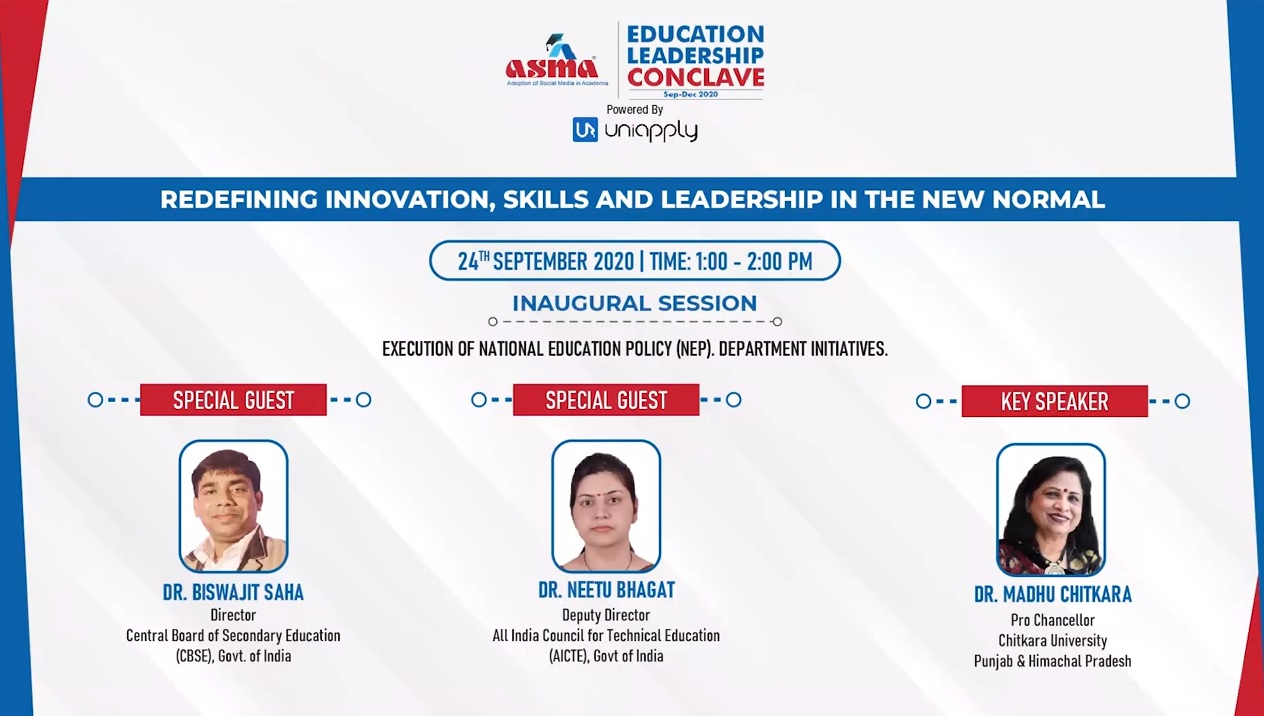ASMA Education Leadership Conclave – Inaugural Session
ASMA Education Leadership Conclave – Inaugural Session
The inaugural event of ASMA Education Leadership Conclave on ‘Redefining Innovation, Skill and Leadership in the New Normal’ was held on 24th September 2020.
The session witnessed a gathering of leaders and stalwarts from the education sector including Special Guests Dr Biswajit Shah, Director, CBSE and Dr Neetu Bhagat, Deputy Director, AICTE and Eminent Speaker Dr Madhu Chitkara, Pro-Chancellor, Chitkara University. The session was moderated by Chandan Anand, Vice-President, InnoServ Group.
Dr Biswajit Saha, Director, CBSE opened the session by emphasising the importance of innovation and leadership in education. He also said that the entire country will benefit from the NEP 2020 if it is implemented in its true spirit.
Dr Saha said to ensure learning is experiential students must be given the opportunity to think and connect with real life. He said, “I think the seed of innovation lies in the freedom in the classroom, school and college eco-systems’.
He also pointed out that educational institutions should focus on connecting with parents of students from all backgrounds, to bring students at par with each other; only then will innovation, leadership and skills will be justified.
He explained that “We know that there are variations of infrastructure and faculty. Through collaborations, we can bridge the gap between schools, parents and students. Peer to peer learning and interactions between schools are simple ways to connect with the people, and this leads to strong innovation with respect to the complexity of human relations in a very simplified way”.
Dr Saha underlined that the pandemic has taught us how to depend on digital learning while pointing out that questions have arisen regarding bridging the rural and socio-economic gap in relation to the digital mode of learning, He remarked, “If in the name of equality and democratising technology, we are sitting idle until the end of the pandemic, I think there will be a huge opportunity lost for schools, universities and learners.” He continued, “Technology has given us this opportunity so we can to redefine and test in which ways beyond the pandemic we can use it (technology)”.
Dr Neetu Bhagat, Deputy Director, AICTE, agreed with Dr Saha, saying that “There should be an integration of all government departments and initiatives and joint and collaborative efforts should be made in the right direction”.
Dr Bhagat commented that the pandemic has affected every sector, including the education sector; however, the sector was prepared for the crisis especially since there was an active effort to promote online education.
She also touched upon the need to enhance skills training in the country, saying, “Global ageing of the workforce is a major problem faced by developed countries. Automation and mechanisation can be a solution to this. India has the potential to fulfil the demand for global talent need, but we face the problem of employability”.
She continued, “Only 5 per cent of the youth belonging to the age group between 20-24 years are getting a formal vocational education, while this figure in other industrial countries is 60-80 per cent, therefore, there is much need for skill education. It is the only way to channel the young energy India has into the right direction”.
Dr Bhagat added, “Skill education needs to be on par with mainstream education”.
Dr Madhu Chitkara, Pro-Chancellor, Chitkara University, emphasised that innovation should have a purpose; that innovation should not only be for the sake of making something, but it should be focused on the betterment of society.
She explained, “At Chitkara, we identify a real problem, through consultations and try to offer solutions which are deployable, scalable and feasible”. “For the past 7-8 years, we have started the Tech Aid programme, where we talk about technology, where school education was in the coding process and we started introducing coding to our student from as early as Class VI”.
Dr Chitkara explained how her institution introduced innovation in pedagogy, she said, “In the new normal and during the lockdown, blended learning was the need of the hour and virtual labs were required”.
Dr Chitkara elaborated on the idea of thought innovation and the use of data analytics. She said, “Every organisation has its own Management Information Systems and thought innovation helps us to make these systems more effective for students and stakeholders”.
She also touched on how Chitkara University is utilising structural innovation, by decentralising and amalgamating the institution’s culture with the corporate world. She said, “Corporate culture is coming into our education culture. We have ‘explore hubs’, which are innovation and incubation centres, where students can sit, discuss and create their own ideas, and they will also receive funding as well”.
In closing, Dr Chitkara signed off by saying, “If we will work coming out of our comfort zone, then only will we be able to develop a system good for a new normal and according to the NEP, and everything should be outcome-driven”.



